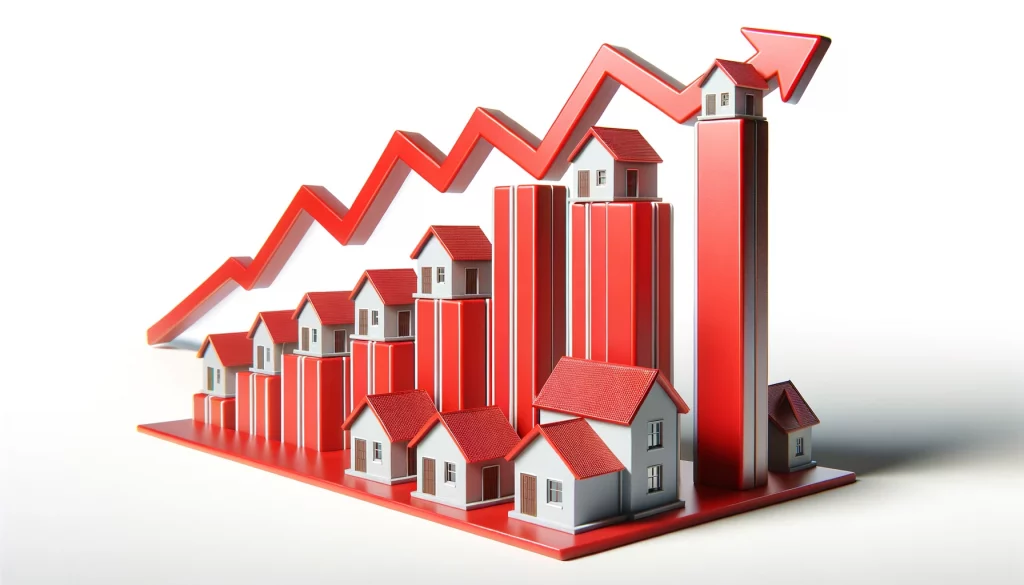American homeowners have witnessed a significant increase in their property values, marking a positive trend in their financial assets, and are using their home equity for house flipping.
At the end of 2024, there was an average increase of $20,000 in home equity, equating to a 6.8% rise from 2023.
The residential property market has remained resilient despite encountering challenges such as the highest mortgage rates in over twenty years. The National Association of Realtors reports an approximate 9% escalation in home prices this year.
This uptick has played a pivotal role in augmenting the equity value, which represents the difference between the property’s current market value and the outstanding mortgage balance.
The growth in home equity is not just a figure on paper; it holds substantial real-world value for property owners. It allows homeowners to access their property’s value, for instance, via a home-equity line of credit. Furthermore, it means more financial gain when selling their property, post-settling the existing mortgage.
CoreLogic highlighted the significant impact of home price growth on equity in a conversation with CBS MoneyWatch. She emphasized that the increase in equity instills a sense of increased wealth among homeowners.
Additionally, accruing equity in a home serves as a financial cushion during emergencies. Also, providing homeowners with an alternative asset source for significant expenditures, like education costs or home renovations.

Trending In the Right Direction
While the general trend in home equity has been positive in the U.S., some regions have experienced a decrease. Texas homeowners, for example, have seen an average equity reduction of around $9,000 compared to last year, per CoreLogic’s findings. This decline is attributed partly to a cooldown in Austin’s property market, which had previously seen a steep price rise during the pandemic. Despite this decrease, Texas homeowners still hold substantial equity, averaging $217,000.
New York and Utah also recorded dips in home equity, with average declines of $7,525 and $873, respectively. Nonetheless, property owners in these states still possess considerable equity, averaging $364,000 in New York and $348,000 in Utah.
Home equity changes are closely tied to shifts in property prices, with some states like Hawaii, California, and Massachusetts experiencing the most substantial gains in 2023. These states are known for their high-value residential properties. For instance, the average equity for homeowners in Hawaii is approximately $717,000, while in California, it’s about $634,000.
The path to wealth through homeownership is evident, as a Federal Reserve report highlights. It noted that equity rose from $139,100 in 2019 to $201,000 in 2022. This trend underscores the potential of residential property ownership as a key contributor to personal financial growth.
Using home equity to finance the flipping of homes can create more wealth without resorting to high-interest loans. Here’s a general overview of how it works:
Home equity is the difference between the market value of your home and the amount you owe on any mortgage. It represents the portion of the property that you truly own. As you pay down your mortgage and your property’s value increases, your equity grows.
Access to Equity
- Home Equity Loan: This second mortgage gives you a lump sum of money based on a portion of your home equity, which you pay back over time.
- Home Equity Line of Credit (HELOC): This is similar to a credit card but with a lower interest rate. You get a credit limit based on your equity and can borrow against it as needed.
- Cash-Out Refinance: This involves refinancing your current mortgage for more than you owe and taking the difference in cash. It can be a good option if you can secure a lower interest rate.
Using Equity for Home Flipping
- Initial Capital: The funds obtained from home equity can be used as the initial capital for purchasing and renovating a flip property. This is often a more cost-effective approach than high-interest loans.
- Renovation and Repairs: Equity can finance the cost of repairs, upgrades, and renovations required to increase the property’s value before selling it.
- Covering Holding Costs: The money can also be used to cover holding costs of the property, such as property taxes, insurance, and utilities, while the property is being renovated and sold.

Benefits
- Lower Interest Rates: Interest rates for home equity loans or HELOCs are generally lower than those for personal loans or credit cards.
- Tax Advantages: The interest paid on home equity loans used to buy, build, or substantially improve the taxpayer’s home that secures the loan can be tax-deductible.
- Increased Investment Capacity: Access to equity can increase your capacity to invest in more lucrative or multiple projects.
Risks
- Debt Against Primary Residence: Using home equity increases the debt against your primary residence. If the home flipping doesn’t yield a return, you risk losing your home.
- Market Volatility: Markets fluctuate. If the market drops, you may owe more than your property is worth.
- Cost Overruns: Flipping homes can sometimes exceed budgeted costs, which the available equity may not fully cover.
Strategic Planning
- Thorough Market Research: Understanding the real estate market and choosing the right property to flip is crucial.
- Budget Management: Keeping a tight rein on budget and timelines to ensure profitability.
- Exit Strategy: Have a clear plan for selling the property and repaying the borrowed equity.
Leveraging home equity for flipping houses can be a smart way to build wealth, provided it’s done cautiously and with thorough market research. It’s always advisable to consult with a financial advisor to fully understand the risks and benefits and ensure this strategy aligns with your overall financial goals.

